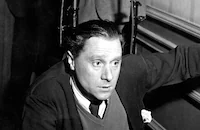The Remarkable Mr. Kipps
Cast & Crew
Carol Reed
Philip Frost
Michael Redgrave
Diana Wynyard
Diana Caldewood
Phyllis Calvert
Film Details
Technical Specs

Synopsis
At the turn of the century, fourteen-year-old Arthur Kipps prepares to leave his small English village to go to Folkestone, Kent, where he is to be apprenticed to draper Edmund Shalford. Before he leaves, Kipps asks his pretty neighbor, Ann Pornick, to be his girl friend, and she cuts a sixpence in half as a remembrance for him. Armed with his token, Kipps travels to Shalford's Bazaar. The self-important Shalford warns the youth that he must obey the rules, then sends him into the store to begin following the bellowed instructions of the senior clerks. Six years later, the adult Kipps works as a salesman in the store and makes the best of his dull existence. One night, Kipps is out with some of the other clerks when a rainstorm forces them indoors and they attend a lecture on self-improvement given by Chester Coote. Coote's lecture stirs Kipps, and the next evening, he goes to the Folkestone Cultural Institute to sign up for a class. As the literature classes are all full, Kipps is cajoled into attending a woodcarving class, but his complaints vanish when he sees the lovely instructor, Helen Walshingham. Helen is amused by Kipps's shy adoration, but assures one of her friends that she would never become involved with a mere shop clerk. After the last class, Kipps walks toward home when he is knocked down by bicyclist Chitterlow. The exuberant out-of-work actor takes Kipps to his home to repair his torn trousers, and soon the pair are drunk as Chitterlow plies Kipps with alcohol and reads excerpts from his new play. Kipps then returns to the store and is fired for staying out all night. Kipps is grimly working the rest of his remaining day when Chitterlow enters and shows him an advertisement seeking the son of Euphemia Kipps. Kipps replies to the ad and is astonished to learn that he is the sole heir of a grandfather he never knew, and is to receive a legacy of £26,000, as well as a large house in Folkestone. Kipps is thrilled by his good fortune, and allows Chitterlow to talk him into investing £300 in his play. At the bank, Kipps runs into Coote, who offers to introduce him to solicitor Ronnie Walshingham. Upon learning that Ronnie is Helen's brother, Kipps agrees, and soon finds himself in the midst of an uncomfortable afternoon with the socially prominent Walshingham family. Helen easily wins Kipps's heart and accepts his proposal of marriage, then sets about "improving" him. With the help of Coote, Helen transforms Kipps into a proper gentleman. One day, Kipps is walking on the beach when he runs into Ann, who now works as a housemaid. Kipps is delighted to meet Ann, and although he tries to tell her about his engagement, his feelings for her overwhelm him and he kisses her. The next day, Kipps accompanies Helen, Ronnie and Coote to a society party and is horrified to discover that Ann works as a maid for the hostess, Mrs. Bindon-Botting. Ann is crushed upon seeing Kipps with Helen and gives him her half sixpence, which she has been saving since childhood. Realizing that he can be happy only with Ann, Kipps persuades her to run off with him and be married in London. There, the young couple set up house, although they quarrel constantly, as Kipps insists that Ann not act like a servant and remember that they have to live up to their position. Ann tries to improve herself but insists that they build only a small house in London, instead of the mansion that is planned for them by an imperious architect. As they are fighting over the house plans, Kipps receives a telegram requesting his presence at Ronnie's office, and, believing that it will be in regards to a breach-of-promise suit from Helen, he wearily sets off. At the office, however, Kipps learns from Helen that Ronnie has disappeared after losing all of Kipps's money through bad investments. Kipps then returns home, and Ann lovingly comforts and encourages him. Just as the couple are going to bed, Chitterlow arrives and shows them the smash notices for his play, in which Kipps had forgotten he had invested. With the proceeds from the long-running play, Kipps opens a bookshop and reflects happily on how life has turned out for him, Ann and their little boy, Artie.

Director

Carol Reed
Cast
Philip Frost

Michael Redgrave

Diana Wynyard
Diana Caldewood

Phyllis Calvert
Arthur Risco
Max Adrian
Helen Haye

Michael Wilding
Lloyd Pearson
Edward Rigby
Mackenzie Ward

Hermione Baddeley
Betty Ann Davies
Arthur Denton
Betty Jardine

Frank Pettingell
Beatrice Varley
George Carney

Irene Browne

Peter Graves
Viscount Castlerosse

Felix Aylmer
Crew

Film Details
Technical Specs

Quotes
Trivia
Notes
The print viewed, entitled Kipps, ran approximately 76 minutes, and was an edited version of the original British release, which ran 112 minutes. Kipps was also the picture's working title. Cecil Beaton's onscreen credit appears in the form of a signature. H. G. Wells's novel had previously been filmed as Kipps in England in 1920. The Stoll production was directed by Harold Shaw and starred George K. Arthur and Edna Flugrath. In 1963, the stage play Half a Sixpence, a musical written by Beverly Cross and based on the novel, opened in London with star Tommy Steele. Steele recreated his role as "Arthur Kipps" in the 1965 Paramount release Half a Sixpence, which was directed by George Sidney and co-starred Julia Foster and Penelope Horner (see AFI Catalog of Feature Films, 1961-70; F6.2012).












